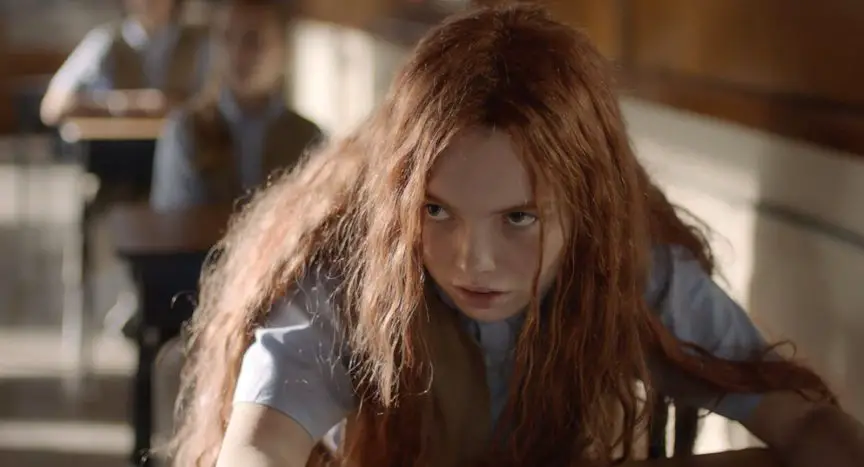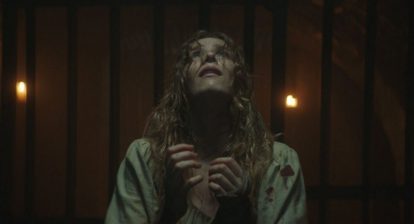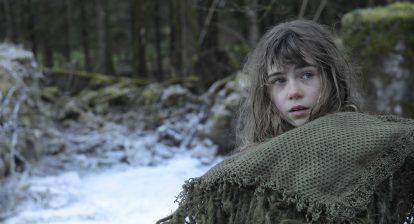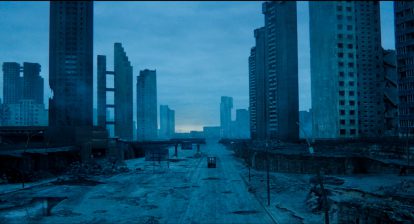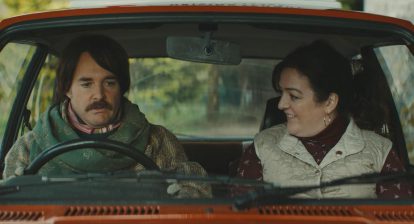Writer-director-star Pollyanna McIntosh’s blunt – and yet multi-edged – object of a film is a guttural, and delightfully weird follow-up to Lucky McKee’s The Woman. Darlin’ is an unruly kid sibling, it’s ultimately a massive breath of fresh air for even small moments of risk-taking, an ambitious scope and contextualization of its grisly material, and for being an unabashedly uncommercial artistic undertaking. She creates a sequel to McKee and the late Jack Ketchum’s The Woman, sure, but McIntosh seemingly approaches her directorial vision as a purposeful variation on that film’s themes and characters, rather than merely a reiteration or a capitalization upon its strength.
Lead actress Lauryn Canny’s take on the idea of the feral child presents a humanity that remains ragged throughout its perilous socialization. It is a notably strong performance. The glimmer of empathetic intellect within her exists from the film’s initial movements – even as the character is at her most raw. Conversely, even as she is sculpted by a belated societal upbringing, her animalism – and the ferocity of her formative experiences – bubbles to the surface in effortless motions.
Darlin’ explores this wild child’s entrance into – and aforementioned socialization within – the rigid and dogmatic structures of a Catholic girl’s school. McIntosh takes the material to the places it needs to go. The film does a quite fabulous job as further emphasizing The Woman’s broad thematic swipes: the transformative effects of abuse, the ultimately corrupt ideation at the core of hierarchical social structures, the mental and physical destruction of women (both those who are innocent, and those who are decidedly not) at the hands of wicked men. McKee more explicitly toyed with exploitation film conventions, positioning The Woman as an answer to the all-too-familiar rote machinery of the rape-and-revenge subgenre. Like that film, McIntosh veers from brutal violence to dark comedy of manners, but her piece is more explicitly mocking the swoons of coming-of-age tales.
Also See: Clownado is an Unnatural Disaster
The ultimately dark worldview of this ‘cinematic universe’ is somewhat thankfully – and wonderfully – curtailed by both The Woman and Darlin’’s great respect shown towards their most central characters. McIntosh’s seething and stalking Woman – skin made ever-pitch-black with dirt, hair hanging to her waist, an ominous figure eschewing the characteristics of the wraiths of horror cliché. She is instead an uncomfortably unfamiliar, feral, unstoppable figure of vengeance incarnate – a presence just as scary as she is innately human. Meanwhile, the titular Darlin’ is made immediately relatable as a victim of circumstance – one we feel would easily enact her own triumph over near-insurmountable adversity if she were only given the tools of self-empowerment, rather than the religious shackles of indoctrination. If only she were taught to trust in herself, rather than made to feel a suffocating guilt about the core of her past experience. As a rumination on the all-too often psychological mistreatment of abuse victims, it rings true as a portraiture of a vulnerable young person made to feel guilt and shame regarding something that was always, tragically, out of her hands.
So much of the power of Darlin’ – even as a counterpoint to McKee’s predecessor – lies in how much the film traces the eventual return of agency to those empty hands of the titular heroine. Lesser filmmakers would merely immerse their audiences in a cloyingly dark worldview, crafting something of a Nietzschean will-to-power foodchain, seeking to endlessly parade before helpless viewers the exploitation of the imprisoned by the wrongfully emboldened.
However, much of these two films seems aimed at deflating those who usurp power only to exploit – from The Woman’s white male patriarch to this film’s further extension into a figure wielding religious authority – and all without losing sight of those whom the narrative most closely identifies with and rightfully humanizes. McIntosh doesn’t shy away from the Catholic church’s brutality, but her physical manifestation of its evils is not a monstrous figure of immense power wielded in horrifying strength. Instead, his villainy emerges as a pathetic sliminess, a self-justification for the unspeakable in the most laughable and moronic childishness. But McIntosh should be commended especially for achieving something that admittedly could never be said of The Woman – she manages to almost entirely condemn such evil without explicitly visualizing the brutalization of women onscreen.
More interestingly, with a tonally angular and caustic film, she reserves visions of violence for the emotional expressions of those identifiable and humane characters’ anxieties, and then the eventual vengeance enacted upon those who have wielded power with cruel intent. If Darlin’ ultimately posits that the foundations of ‘civilization’ are deeply flawed for their lack of a deliberate condemnation of untenable evil (fair enough), then regardless, the film does not collapse under the weight of misanthropy and nihilistic exhaustion. To the contrary, both the untamed wilds of instinct and the rigid ladders of social code beget regrettable violence. The striking humanity McIntosh finds caught in the in-between commands attention – crucially – on its own accord.
Darlin’ is out now on DVD and Blu-Ray from Dark Sky Films.
Wicked Rating – 8/10
Director(s): Pollyanna McIntosh
Writer(s): Pollyanna McIntosh
Stars: Lauryn Canny, Pollyanna McIntosh, Cooper Andrews, Bryan Batt, Nora-Jane Noone
Studio/Production Co: Hood River Entertainment, Dark Sky Films
Language: English
Run Time: 100 Minutes
